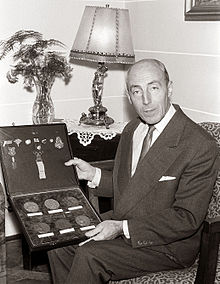
The men's horizontal bar was a gymnastics event contested as part of the Gymnastics at the 1964 Summer Olympics programme at the Tokyo Metropolitan Gymnasium. The event was held on 18, 20, and 23 October. There were 128 competitors from 29 nations, with nations in the team competition having up to 6 gymnasts and other nations entering up to 3 gymnasts. The event was won by Boris Shakhlin of the Soviet Union, the nation's first victory in the horizontal bar after two Games with silver and bronze medals. The Soviets also took silver, with Yuri Titov finishing second. Shakhlin and Titov were the fifth and sixth men to win multiple medals in the horizontal bar. Bronze went to Miroslav Cerar of Yugoslavia.
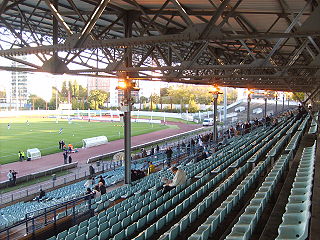
The men's parallel bars event was part of the gymnastics programme at the 1924 Summer Olympics. It was one of nine gymnastics events and it was contested for the third time after 1896 and 1904. The competition was held on Sunday, July 20, 1924. Seventy-two gymnasts from nine nations competed. The event was won by August Güttinger of Switzerland, the nation's first victory in the event. Robert Pražák of Czechoslovakia and Giorgio Zampori of Italy earned silver and bronze, respectively.

The men's pommel horse event was part of the gymnastics programme at the 1924 Summer Olympics. It was one of nine gymnastics events and it was contested for the third time after 1896 and 1904. The competition was held on Wednesday, July 23, 1924. Seventy gymnasts from nine nations competed, with each nation having an 8-gymnast team. The event was won by Josef Wilhelm of Switzerland, the nation's second victory in the event. With Swiss gymnasts Jean Gutweninger and Antoine Rebetez taking silver and bronze, respectively, it was the second consecutive appearance of the event in which the event's medals were swept.

The men's rings event was part of the gymnastics programme at the 1924 Summer Olympics. It was one of nine gymnastics events and it was contested for the third time after 1896 and 1904. The competition was held on Saturday, July 19, 1924. Seventy gymnasts from nine nations competed, with each nation having an 8-gymnast team. The event was won by Francesco Martino of Italy, the nation's first medal in the event. Robert Pražák and Ladislav Vácha of Czechoslovakia earned silver and bronze, respectively.
The men's vault event was part of the gymnastics programme at the 1924 Summer Olympics. It was one of nine gymnastics events and it was contested for the third time after 1896 and 1904. The competition was held on Monday, July 21, 1924. Seventy gymnasts from nine nations competed. The eight members of each nation's gymnastics team all competed; Czechoslovakia only had six competitors start the vault. The event was won by Frank Kriz of the United States, the nation's second consecutive victory in the event. Jan Koutný and Bohumil Mořkovský of Czechoslovakia took silver and bronze, respectively, the nation's first medals in the event.

The men's rope climbing event was part of the gymnastics programme at the 1924 Summer Olympics. It was one of nine gymnastics events and it was contested for the third time after 1896 and 1904. The competition was held on Sunday, July 20, 1924. Seventy gymnasts from nine nations competed. The event was won by Bedřich Šupčík of Czechoslovakia. Albert Séguin of France took silver, while August Güttinger of Switzerland and Ladislav Vácha tied for bronze. All three medaling nations were making their debut in rope climbing, so they were the first medals for each in the event.

The men's artistic individual all-around event was part of the gymnastics programme at the 1924 Summer Olympics. It was one of nine gymnastics events and it was contested for the sixth time. The competition was held from Thursday, 17 July 1924, to Wednesday, 23 July 1924. Seventy-two gymnasts from nine nations competed. Each nation could send up to 8 gymnasts, up from 6 in previous Games. For the first time since 1904, the scores for individual competitors were used to calculate a team score. The men's artistic individual all-around was won by Leon Štukelj of Yugoslavia. Czechoslovakia's Robert Pražák took silver, while Bedřich Šupčík earned bronze. Both nations were making their debut in the event.

The men's parallel bars event was part of the gymnastics programme at the 1928 Summer Olympics. It was one of seven gymnastics events for men and it was contested for the fourth time after 1896, 1904, and 1924. The competition was held on Thursday, August 9, 1928. Eighty-five gymnasts from eleven nations competed, with each nation having a team of up to 8 gymnasts. The event was won by Ladislav Vácha of Czechoslovakia, the nation's first victory in the men's parallel bars. The silver medal went to Josip Primožič of Yugoslavia, with Hermann Hänggi of Switzerland earning bronze.

The men's horizontal bar event was part of the gymnastics programme at the 1932 Summer Olympics. It was contested for the fifth time after 1896, 1904, 1924, and 1928. The competition was held on Thursday, August 11, 1932. Twelve gymnasts from six nations competed. Each nation was limited to three gymnasts. The event was won by Dallas Bixler of the United States, the nation's first victory in the men's horizontal bar since 1904 and second overall. Heikki Savolainen and Einari Teräsvirta of Finland tied for second; the two agreed that Savolainen would take silver and Teräsvirta bronze. They were the first medals for Finland in the horizontal bar.
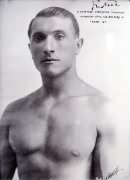
The men's artistic individual all-around event was part of the gymnastics programme at the 1932 Summer Olympics. It was the eighth appearance of the event, which was established in 1900. The competition was held from Monday, August 8, 1932, to Wednesday, August 10, 1932. Twenty-four gymnasts from five nations competed. Each nation could enter a team of 5 gymnasts; Hungary sent only 4. The event was won by Romeo Neri of Italy, the nation's first victory in the event since 1920 and fourth overall. István Pelle of Hungary took silver and Heikki Savolainen of Finland earned bronze; it was the first medal in the event for each nation.

The men's pommel horse event was part of the gymnastics programme at the 1928 Summer Olympics. It was one of seven gymnastics events for men and it was contested for the fourth time after 1896, 1904, and 1924. The competition was held on Wednesday, August 8, 1928. Eighty-eight gymnasts from eleven nations competed, with each nation having a team of 8 gymnasts. The event was won by Hermann Hänggi of Switzerland, the nation's second consecutive victory in the pommel horse. The Swiss nearly repeated their 1924 medal sweep, with 4 of the top 5, but Finland's Heikki Savolainen took bronze between silver medalist Georges Miez and fourth-place finisher Edi Steinemann. It was Finland's first medal in the event.

The men's horizontal bar competition was one of eight events for male competitors in artistic gymnastics at the 1988 Summer Olympics in Seoul. The qualification and final rounds took place on September 18, 20 and 24th at the Olympic Gymnastics Hall. There were 89 competitors from 23 nations, with nations competing in the team event having 6 gymnasts and other nations having up to 3 gymnasts. There were ties for both gold and bronze medals. The Soviet Union took two golds, as Vladimir Artemov and Valeri Liukin finished even at the top spot; they were the Soviets' first gold medals in the horizontal bar since 1968, and moved the Soviet Union past the United States and Switzerland into second most all-time golds in the event. Bronze medals went to Holger Behrendt of East Germany and Marius Gherman of Romania, the first medal in the event for both nations. It was the first time since 1964 that Japanese gymnasts competed but did not win the event.

The men's horizontal bar competition was one of eight events for male competitors in artistic gymnastics at the 1976 Summer Olympics in Montreal. The qualification and final rounds took place on July 18, 20, and 23rd at the Montreal Forum. There were 90 competitors from 20 nations, with nations competing in the team event having 6 gymnasts while other nations could have up to 3 gymnasts. The event was won by Mitsuo Tsukahara of Japan, the second man to successfully defend an Olympic title in the horizontal bar. It was the third consecutive victory by a Japanese gymnast in the event, and fifth in six Games. Japan also took silver, as Eizo Kenmotsu finished second, but was prevented from repeating its 1972 podium sweep by new rules that limited nations to two gymnasts in the final. Tsukuhara and Kenmotsu were the seventh and eighth men to win multiple medals in the horizontal bar. Henri Boerio of France and Eberhard Gienger of West Germany tied for bronze, the first medal for France in the event since 1924 and first horizontal bar medal for West Germany.
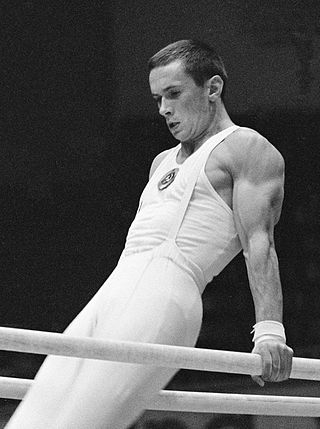
The men's horizontal bar competition was one of eight events for male competitors in artistic gymnastics at the 1968 Summer Olympics in Mexico City. The event was held on 22, 24, and 26 October. There were 115 competitors from 27 nations, with nations in the team competition having up to 6 gymnasts and other nations entering up to 3 gymnasts. The event was won in a tie between Akinori Nakayama of Japan and Mikhail Voronin of the Soviet Union. Eizo Kenmotsu of Japan took bronze.

The men's parallel bars competition was one of eight events for male competitors in artistic gymnastics at the 1956 Summer Olympics in Melbourne. It was held from 3 to 7 December at the Melbourne Festival Hall. There were 63 competitors from 18 nations, with nations in the team competition having up to 6 gymnasts and other nations entering up to 3 gymnasts. The event was won by Viktor Chukarin of the Soviet Union, the nation's first victory in the parallel bars. Japan took three medals: a silver by Masumi Kubota and bronzes by Takashi Ono and Masao Takemoto. It was the third time a nation had won three medals in the event in the same Games: the United States had swept the medals in 1904 and Switzerland had earned a gold and two bronzes in 1948. Chukarin was the third man to win multiple medals in the parallel bars; Ono would become the fourth in 1960.

The men's rings event was part of the gymnastics programme at the 1928 Summer Olympics. It was one of seven gymnastics events for men and it was contested for the fourth time after 1896, 1904, and 1924. Scores from the rings event were added to the results from other individual apparatus events to give aggregate scores for the individual and team all-around events. Eighty-eight gymnasts from eleven nations competed, with each nation having a team of 8 gymnasts. The event was won by Leon Štukelj of Yugoslavia, the nation's first medal in the rings event. For the second consecutive Games, Czechoslovakian gymnasts took both silver and bronze: Ladislav Vácha finished second and Emanuel Löffler is credited with a third place finish. Vácha, the bronze medalist in 1924, was the first man to win multiple medals in the event.

The men's vault event was part of the gymnastics programme at the 1928 Summer Olympics held in Amsterdam. It was one of seven gymnastics events for men and it was contested for the fourth time after 1896, 1904, and 1924. Scores from the vault event were added to the results from other individual apparatus events to give aggregate scores for the individual and team all-around events. There were 85 competitors from 11 nations. Each nation had a team of 8 gymnasts; three of the 88 men did not start. The event was won by Eugen Mack of Switzerland, the nation's first victory in the event and first medal since 1896. Emanuel Löffler gave Czechoslovakia its second consecutive silver medal. Stane Derganc's bronze was Yugoslavia's first medal in the event.
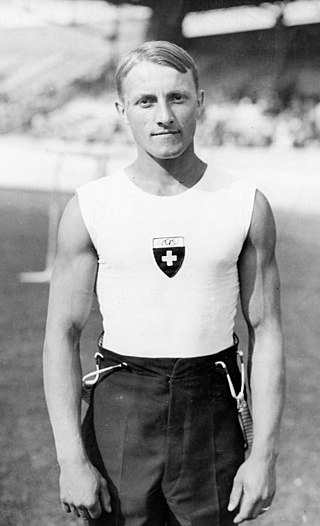
The men's horizontal bar event was part of the gymnastics programme at the 1928 Summer Olympics. It was one of seven gymnastics events for men and it was contested for the fourth time after 1896, 1904, and 1924. Scores from the horizontal bar event were added to the results from other individual apparatus events to give aggregate scores for the individual and team all-around events. There were 86 gymnasts from 11 nations, with each nation having a team of up to 8 gymnasts. The event was won by Georges Miez of Switzerland, the nation's first victory in the men's horizontal bar. The silver medal went to Romeo Neri of Italy, with Eugen Mack of Switzerland earning bronze.

The men's artistic individual all-around event was part of the gymnastics programme at the 1928 Summer Olympics. It was one of seven gymnastics events for men and was the seventh Olympic men's all-around gymnastic championship. Scores from the individual apparatus events were added to give aggregate scores for the individual all-around; individual all-around scores were similarly summed for the team all-around event. There were 88 competitors from 11 nations. Each nation sent a team of 8 gymnasts. The event was won by Georges Miez of Switzerland, with his countryman Hermann Hänggi taking silver. They were the first medals in the event for Swiss gymnasts since 1904 and the first gold medal ever for a Swiss man in the individual all-around. Defending Olympic champion Leon Štukelj of Yugoslavia finished with the bronze this time, making him the third man to win multiple medals in the event.

The men's rings competition at the 1936 Summer Olympics was held at the Waldbühne on 10 and 11 August. It was the sixth appearance of the event. There were 111 competitors from 14 nations, with each nation sending a team of up to 8 men. The event was won by Alois Hudec of Czechoslovakia, the nation's first victory after winning two silver medals and two bronze medals in 1924 and 1928. Leon Štukelj was the silver medalist in Berlin, the second man to earn two medals in the rings after his 1928 gold. Host Germany took a bronze medal, its first in the rings since 1896, as Matthias Volz finished third.
